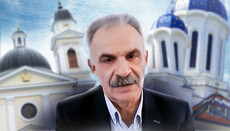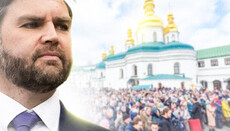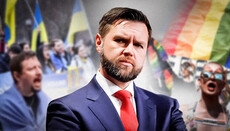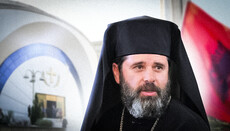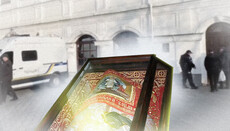The spectre of the third union with Catholics is no longer a spectre
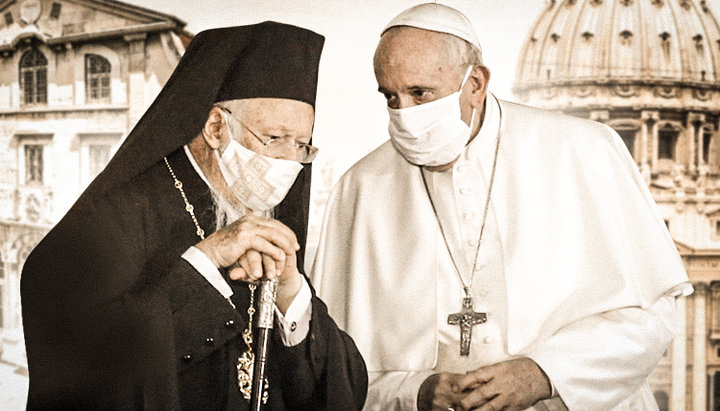
Pat. Bartholomew gave an interview, where he confirmed the course of unity with Catholics to be accomplished in 2025, on the 1700th anniversary of the Council of Nicaea.
A lot of readers are already tired of the abundant publications about Patriarch Bartholomew regarding his ambiguous narrative about what is happening in the Church and joint photos with Pope Francis. One could give up on covering the rhetoric and actions of this person, if he did not position himself as the first without equals, the “head” of Orthodoxy, whom the Church and believers are obliged to listen to and obey. And if to leave everything to chance, then at some point it may turn out that this very “chief” in Orthodoxy will lead the Church to the wrong destination. Such plans are being discussed even more frequently and publicly. However, first things first.
On February 13, 2021, Patriarch Bartholomew of Constantinople gave another interview, in which he confirmed that his activities in the near future are aimed at union with Rome. 2In addition, there are many equally important revelations in the interview, which indicate that Orthodoxy is facing difficult times.
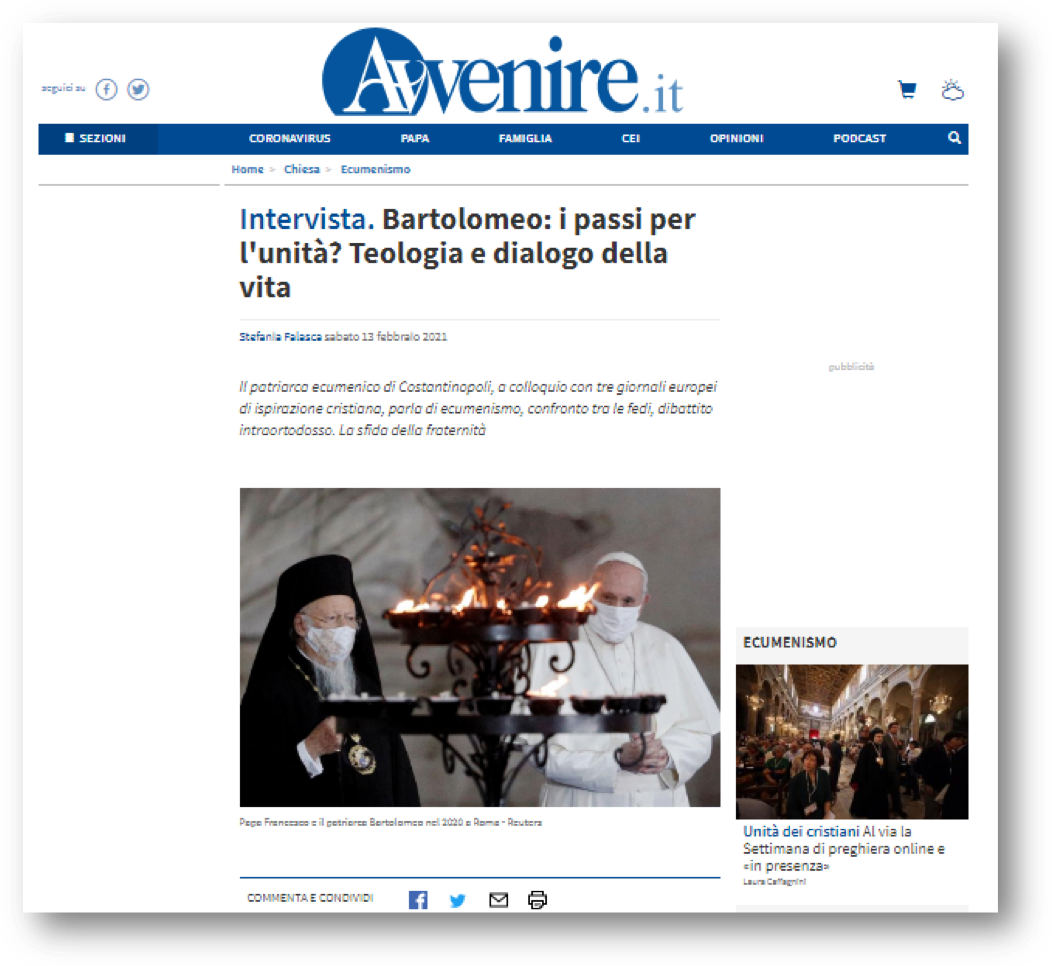
Before proceeding to the analysis of the interview, one should pay attention to the fact that it took place with an eye to the 30th anniversary of Bartholomew patriarchy, which will be celebrated on November 2, 2021. This was mentioned separately in the text. This means that the interview itself is not a walk-through, but to some extent sums up these 30 year-term. In such cases, both the questions and the answers in the interview are thought over and agreed upon in advance. As a result, we have not just a conversation with a journalist, but a certain meaningful message that Patriarch Bartholomew wants to get across to a certain audience. In this case, it can be assumed that such an audience is primarily the liberal political circles and the strata of the population who sympathize with them, as well as Catholics and Pope Francis personally. The messages voiced by Patriarch Bartholomew are addressed primarily to them and consist in confirming loyalty to the so-called liberal agenda and the invariability of the course towards joining the Vatican. As a matter of fact, the preamble of the interview on the website avvenire.it honestly says that the interview was prepared by a number of European Protestant publications.
In the interview, Patriarch Bartholomew answered questions about the unification with Rome, about his activities in Ukraine, the conflict in Orthodoxy caused by this activity, about the transformation of Hagia Sophia into a mosque, and so on. However, this is not the most significant message. The most important thing that follows from the interview is the church identity of Patriarch Bartholomew and, indirectly, of the entire Patriarchate of Constantinople.
On church identity
At the very end of the interview, the Avvenire journalist asked the question: "In your opinion, what does the authority of religions depend on today?" The question is asked in a secular style, but it means the following: what is the essence of religion, what should religion show to the world? And since the question was asked to the primate of one of the Orthodox Churches, the answer had to be given on behalf of the Orthodox Church.
Before citing the answer of Patriarch Bartholomew, let us turn to the holy fathers and see how they could answer this question. For example, the Monk Ephraim the Syrian would say that the value of the Church lies in the fact that God lives in it: “Blessed are you, Church of the faithful, for the King of kings has established His dwelling place in you. Your foundations will never be shaken, for the Lord is your guardian, and the gates of hell will not prevail against you, and predatory wolves cannot crush or weaken your fortress. Oh, how great you are, the House of God! How beautiful you are!"
Saint Theodoret of Cyrus says the same: "Christ the Lord takes the place of the Head, and those who believe in Him take the place of the Body."
Saint Cyprian of Carthage would say that the value of the Church is in the salvation of people: "There is no life outside the Church: the House of God is one, and no one can be saved anywhere but in the Church."
Saint Cyril of Jerusalem points out that the Church reveals the Truth to people: "The Church teaches without any damage all the dogmas that people need to know."
Likewise, St. Theophilus of Antioch: "For sailors, God intended the islands as a refuge, and for a world overwhelmed by sin, He bestowed holy churches which follow the teaching of truth."
Without exception, all the holy fathers say that the value (authority, in secular terminology) of the Church of Christ (which is one and the same as the Christian religion) lies in the fact that in this Church a person unites with God and saves his soul for eternal life ... Below is what Patriarch Bartholomew answers: “Today, the authority of religions is widely assessed by their contribution to the struggle for peace. It is unacceptable for religions, forces of peace and reconciliation, to be fanatical and divisive. Neither scientific progress, nor economic development, nor communication via the Internet is sufficient to achieve peace. We, Christians, while serving the peace cause and in the struggle for justice, bear the highest duty – to show the indissoluble unity of love for God and love for our neighbor."
The above means that even the commandments of love for God and neighbor, according to Patriarch Bartholomew, should serve the cause of the struggle for peace and justice. Not a word about Christ, not a word about the salvation of the soul, not a word about the Kingdom of Heaven, not a word about repentance! However, the preaching of both Christ and St. John the Forerunner and the holy apostles began with nothing more than "Repent, for the kingdom of heaven has come near" (Matt. 4:17).
Mission of the Church
Defining the mission of the Church, Patriarch Bartholomew first says the seemingly correct words: "The mission of the Church is the testimony of the Gospel and the transformation of the world into Christ, which, obviously, is not achieved by indifference to him or his rejection." But then, revealing their meaning, it shows that these are nothing more than beautiful words: “As a patriarch, I fought for stability and unity of Orthodoxy, for intercultural, interreligious, inter-Christian dialogue, and I took a lot of initiatives to protect the environment, to maintain peace and solidarity, respect for human rights, the first of which being the freedom of religion, which is always based on the inexhaustible source of the Orthodox tradition. And the promotion of Christian unity is a fact I considered very important throughout my life." That is, in reality, Patriarch Bartholomew is engaged in three things:
- ecumenism;
- protection of the world and nature;
- stability and unity of Orthodoxy.
Moreover, all the actions of not only Patriarch Bartholomew, but also of his predecessors over the past hundred years, testify to what Phanar understands by the stability and unity of Orthodoxy. This is when the Patriarchate of Constantinople is at the head of the entire Church and interferes in the affairs of the Local Churches. In the matter of protecting peace and nature, Phanar has poor performance. But this is done not for the result, but for the image. Anyway, I would like to linger on ecumenism in more detail.
About ecumenism
At the very beginning of the interview, Patriarch Bartholomew lists all the merits of his Church in cooperation with heretics: “The Ecumenical Patriarchate is not limited to participation in ecumenical events, but is one of the founders and central sponsor of the WCC (World Council of Churches – Ed.). By the 500th anniversary of the beginning of the Lutheran Reformation, the Ecumenical Patriarchate took part in various events. Of particular symbolic significance is the fact that in 1981, 400 years after the end of theological contacts by correspondence between Tübingen and the Ecumenical Patriarch Jeremiah II Tranos, an official theological dialogue began between the Lutheran World Federation and the entire Orthodox Church."
But what about those who believe that Catholics, Lutherans, Protestants, and so on are not Churches with which “we need to conduct a theological dialogue,” but communities that have fallen away from the Church, the only dialogue with which can be conducted only in terms of the ways of returning to Orthodoxy? The Patriarch said the following about them, “In today's Orthodox world there are various groups that express an extreme anti-ecumenical spirit and characterize ecumenism as ‘heresy’. The Holy and Great Council of the Orthodox Church, held in Crete in 2016, condemned all those who ‘under the pretext of defending true Orthodoxy’ violate the unity of the Church."
That is, those who consider non-Orthodox religious structures to be heretics, according to Patriarch Bartholomew, violate the unity of the Church. These include, for example, Metropolitan Athanasios of Limassol, who refused to sign the documents of the Cretan Council, explaining that "there are no churches and confessions, there are only those who have left the Church, and they should be called heretics and schismatics."
Those who consider non-Orthodox religious structures to be heretics, according to Patriarch Bartholomew, violate the unity of the Church.
Is Metropolitan Athanasios of Limassol the only one in the history of Orthodoxy? Not at all. All the holy fathers belong to such “violators of the unity of the Church”. The quintessence of this opinion is the phrase of St. Cyprian of Carthage: "He who is outside the Church could be saved only if someone who was outside the ark of Noah could have been saved." Any efforts to find a saint (both ancient and close to us in terms of time of life), who would speak positively about ecumenism, will not be crowned with success. The history of ecumenism in the form in which it exists today is about a hundred years old and this history unequivocally testifies that ecumenism has almost nothing to do with the testimony of Christ, as the apostles and all their followers understood it.
St. Ignatius (Brianchaninov) also wrote that no theological dialogue with those who have deviated from the Orthodox faith is possible: “Are the heretics Christians? Where did you get this? Numerous hosts of saints suffered martyrdom, preferred the most fierce and prolonged torment, prison, exile, rather than agreed to participate with the heretics in their blasphemous teaching. The Ecumenical Church has always recognized heresy as a mortal sin, has always recognized that a person infected with the terrible disease of heresy is dead in soul, alien to grace and salvation, being in communion with the devil and his destruction ...”
On connection with the Vatican
In an interview, Patriarch Bartholomew spoke very warmly about Pope Francis, said that he had met with him about ten times and that their efforts were aimed at unification: "Of course, the question of the path to unity and the progress of theological dialogue remains of central importance in our relations."
Several months ago, in a sermon on the feast of the Holy Apostle Andrew the First-Called, Patriarch Bartholomew said that dialogue between Catholics and Orthodox leads to complete unity. At the same time, he asserted that such a unity will come "despite the objections of those who either underestimate the value of theology or consider ecumenism a utopia." Now the head of Phanar has outlined more specific contours of such unity. He stated that the movement towards unity can be significantly advanced in connection with the upcoming anniversary of the First Ecumenical Council in Nicea in 2025: “Undoubtedly, the 1700th anniversary of the First Ecumenical Council of Nicea in 2025 can serve as an opportunity for Christian Churches to reflect on their own path , over the mistakes of the past and the present, as well as take more serious steps."
Even Patriarch Bartholomew himself probably does not know what is meant by these "more serious steps". There are still four years ahead before the round date, during which a lot can happen in the world. Therefore, one can assume anything, from a simple meeting to a full-fledged association. One thing is certain: both Pope Francis and Patriarch Bartholomew will try to use the anniversary of the Council of Nicaea to their best advantage with a view to the full unification of the Vatican-Phanar and those who obey to the claims of Patriarch Bartholomew for primacy in Orthodoxy.
Patriarch Bartholomew also revealed some contours of a possible unification: “The First Ecumenical Council of Nicaea is a symbol, a station, a turning point in the history of Christianity, not only because it formulated the Creed, but also because it issued 20 canons. Nicaea, therefore, offers a unique opportunity for an appreciation of our common canonical heritage of the first millennium and for an examination of the importance of canon law as an instrument for the promotion of ecumenical dialogue.” Analyzing the statements of Patriarch Bartholomew over the recent period, one can see how he literally absolutizes, dogmatizes the canonical rules of the Ecumenical Councils. Why is he doing this?
The answer is because he wants to convince everyone that the canons cement forever and ever the political circumstances that existed in the first millennium. This means that the Roman (Byzantine) Empire still exists, Constantinople is still the reigning city, and the Patriarch of Constantinople still heads the most numerous Local Church. Patriarch Bartholomew and supporters of "Orthodox papism" are even trying to deduce the primacy of power of the head of Phanar from the canons, but we will not dwell on this issue now. In relation to the idea of unification with Catholics, the absoluteness of the canons leads to the assertion that since the canons of the Ecumenical Councils speak of the Roman Church as one of the Local Churches and, at the same time, the preeminent one, then this is still the case despite the fact that the Vatican introduced new dogmas and distorted the teaching of the Church.
Thus, it is quite clear that Patriarch Bartholomew is leading his supporters to the third (after Lyons in 1274 and Florentine in 1439) union with the Vatican, and 2025 is a milestone to either usher in this union or make a big step towards it.
In his interview, Patriarch Bartholomew also spoke about his actions in Ukraine, on the split between the Local Churches, on the issue of his primacy, the transformation of Hagia Sophia into a mosque and others. We will not address these statements of his now (since nothing new was said), but take a look instead on how Phanar's ambition to unite with the Vatican can affect the Orthodox Church.
Patriarch Bartholomew is leading his supporters to the third (after Lyons in 1274 and Florentine in 1439) union with the Vatican, and 2025 is a milestone to either usher in this union or make a big step towards it.
How events can develop
Today, the Local Orthodox Churches are split; there is no Eucharistic communion between the Russian Church and the Church of Constantinople and partially the Churches of Greece, Alexandria and Cyprus. The ROC maintains contact only with those hierarchs of the above Churches who have declared that they do not recognize the "Orthodox Church of Ukraine". This recognition or non-recognition is, apparently, the criterion for this “demarcation”. However, in reality, everything is much more serious. The creation of the OCU by Phanar and the granting of the Tomos of conventional autocephaly to it is only a visible manifestation of Phanar's claims to dominance in Orthodoxy.
For many decades the Patriarchate of Constantinople has been promoting the idea of its own primacy in Orthodoxy, saying that Orthodoxy simply cannot exist without this primacy. The quintessence of this ideology was the article by the current head of the American Archdiocese of the Patriarchate of Constantinople, Archbishop Elpidophoros (Lambriniadis) "The First Without Equals". It was precisely by fulfilling this concept, according to which the Patriarch of Constantinople has the power to interfere in the affairs of any Local Church to do as he sees fit, that Patriarch Bartholomew took his well-known actions in Ukraine. The Local Churches were facing a dilemma: to agree with them or not? Thus, the question of recognizing the OCU became a question of recognizing the supremacy of Phanar in Orthodoxy. The Alexandrian, Greek and Cypriot Churches agreed to recognize it, though not in the entire plentitude. We’d better not talk now about the pressure on these Churches from the American Department of State. It may well happen that some other Local Churches recognize the OCU too.
But it is one thing to recognize the OCU and even agree with the leadership of Phanar and quite another to take part in the union with the Catholics. The situation is developing in such a direction that the former will entail the latter. At this point, when the bishops of various Local Churches realize that the recognition of the OCU is not the end of the story, and they will be forced to follow Phanar into the union, a completely different scenario may arise. As the sad experience of the Lyons and Florentine Union shows, the church people and ordinary clergy approach the ideas of unification with Catholics extremely negatively. This rejection can also push wavering bishops to remain faithful to Orthodoxy. Who Sergei (Epiphany) Dumenko is and why he does not have canonical consecration is unknown to many, but who Catholics are and why unification with them is a deviation from Orthodoxy is understood by a much larger number of people.
Therefore, it can be assumed that as 2025 approaches and the prospects for union with the Vatican become clearer, there will be fewer and fewer people willing to follow Phanar. I wish it could be so. Perhaps we will see the Churches that have recognized the OCU back out of their recognition. Perhaps this will happen after the change of leadership of these Churches. But those who nevertheless decide to follow in the wake of the Patriarchate of Constantinople will, as they say, cross the Rubicon, and thus the division existing today between the Local Churches will grow into a real schism.
In any case, the Orthodox Church is going to face difficult times when it will have to defend its loyalty to Christ and prove its right to believe and live as the holy fathers commanded.
